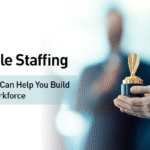From Policy to Practice: How HR Partners Can Drive Gender Equality in the Workplace
Gender equality has become a major focus in modern workplaces. Many companies today want to create fair and equal environments for everyone. But while they make policies to support gender equality, putting those ideas into action is still a challenge. This is where HR teams and recruitment companies in the UAE can help. They can turn good intentions into real changes at work.
What is Gender Equality?
Gender equality means giving people of all genders the same treatment. It includes equal pay, equal chances to grow, and equal access to opportunities. Equal treatment means treating everyone the same, regardless of their differences.
Companies that focus on gender equality enjoy many benefits:
- Employees stay longer because they feel respected.
- Teams perform better due to diverse viewpoints.
- Innovation increases as ideas come from different people.
Even with these benefits, many companies still struggle to turn their policies into action. This is where HR can take the lead.
UAE’s Progress in Gender Equality
The UAE has made significant strides in gender equality, ranking 69th out of 148 countries in the World Economic Forum’s Global Gender Gap Report 2025, with a gender parity score of 0.724, leading the MENA region. A 4.5% year-on-year increase in women’s leadership hiring and full parliamentary parity highlight this progress.
1. Start with Fair Hiring
The first step toward equality is how companies hire people. Job descriptions should use neutral language that doesn’t suggest the role is suited for any specific type of person. Words like “strong” or “caring” may unintentionally discourage some applicants.
Recruitment should use blind hiring techniques, where names and personal details are hidden. This helps hiring teams focus on skills and experience. Structured interviews and clearly defined evaluation criteria reduce the risk of bias. Training hiring managers to recognize and avoid bias is also crucial. Balanced interview panels with a diverse mix of individuals further reflect a commitment to fairness.
Statistic: Only 40% of UAE employees work in gender-balanced teams, but women-led teams are twice as likely to be balanced, emphasizing the need for diverse hiring practices.
2. Close the Pay Gap
The gender pay gap is still a problem in many places. HR can fix this by doing regular salary checks. Everyone doing the same job should be paid the same, no matter their gender.
Pay should be based on what the job is worth, not on what someone earned before. HR should use salary bands and make the rules for promotions clear. When people know how to grow and what they’ll earn, they feel more secure and motivated.
Statistic: In the UAE, 61% of women believe their company ensures fair pay, though transparency is needed at all levels.
3. Create Fair Opportunities for Leadership
Mentorship programs shouldn’t just connect individuals, they should create access to decision-making spaces and open doors that have long been closed. Targeted development programs must address not only skill-building but also the biases and structural gaps that hinder fair advancement.
Statistics: 29% of UAE women cite a lack of mentors as a career barrier, and only 57% feel comfortable speaking up in meetings, compared to 69% of men.
4. Offer Flexible Work
Flexible work helps many people, especially women who care for family members. Giving options like work-from-home, part-time jobs, or flexible hours helps people manage work and life.
Parental leave should be equal for men and women. When men take leave too, it breaks old stereotypes. HR must make sure that no one is treated unfairly for using these benefits. A culture that values work output over hours spent in the office leads to better results and happier employees.
Statistic: Women in the UAE are four times more likely than men to identify lack of childcare as a career roadblock.
5. Create a Respectful Culture
The work environment plays a major role in how people feel at work. HR should build a culture where respect, empowerment, and safety are prioritized. There should be a safe and simple process for reporting concerns like discrimination or harassment. The system must ensure fairness and protect those who speak up. Recognizing achievements from a wide range of employees shows that the organization truly values equality.
Statistic: 63% of UAE women report experiencing exclusion or microaggressions, compared to 50% of men.
6. Track and Improve Progress
To know whether efforts are working, HR needs to track progress. Important data to collect includes:
- Representation across departments
- Hiring and promotion rates
- Pay comparisons
- Anonymous employee feedback
Sharing this information with teams builds trust and transparency. It also helps leaders make informed decisions. Regular updates demonstrate that the organization is committed to long-term fairness.
Statistic: 97% of UAE employees view private sector interventions to improve women’s leadership representation as at least moderately effective.
7. Learn from Leading Examples
Many companies around the world are improving equality through smart initiatives, such as:
- Ensuring interview panels include diverse members
- Offering mentoring support for those returning from career breaks
- Creating internal support groups or employee networks
- Providing on-site childcare or mental health support
These practices benefit both employees and the business. Supported and valued workers tend to stay longer and contribute more effectively.
8. Work with the Right Partners
Gender equality isn’t just HR’s job. External hiring partners also play a big part. Recruitment companies in the UAE must support fairness by recommending a diverse range of candidates and guiding clients to use fair hiring methods.
They should help clients write inclusive job descriptions and educate them on gender-neutral hiring. When HR teams and recruiters work together, the hiring process becomes stronger and more equal.
Equality in Action: The Role of HR in Shaping Fair Workplaces
Gender equality is not a one-time task. It is an ongoing journey. HR teams play a big part in leading this journey. From how people are hired to how they grow in their careers, HR has the power to make workplaces better for everyone.
Companies in the UAE and elsewhere are becoming more diverse and global. To succeed, they need fair and inclusive work environments. By investing in Human Capital, organizations can ensure that gender equality is not just a policy but a part of everyday work life.
When equality is built into hiring, promotions, pay, and culture, everyone benefits. Employees feel safe and supported. Companies perform better. And society moves one step closer to fairness for all.


